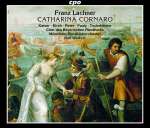|
Back
01/14/2019
Franz Lachner: Catharina Cornaro
Kristiane Kaiser (Catharina Cornaro), Daniel Kirch (Marco Venero), Mauro Peter (Jakob II), Simon Pauly (Andrea Cornaro), Christian Tschelebiew (Onofrio), Bavarian Radio Chorus, Munich Radio Orchestra, Jörn Hinnerk Andresen (chorus master), Ralf Weikert (conductor)
Live recording: Prinzregententheater, Munich, Germany (October 14, 2012) – 151’58
cpo 77 812-2 (Distributed by Naxos of America) – Notes and libretto in German and English

   
Here is an overlooked gem.
The German-born Franz Lachner (1803-1890) spent youthful years in Vienna where he was in Franz Schubert’s musical circle. He achieved a degree of prominence and was named Court Music Director in Munich, where he served for over 25 years until a new era opened up and he was replaced by Wagner’s champion, Hans von Bülow. Catharina Cornaro continued to be performed until around the turn of the 20th century when so many mainstays of the repertory faded from view.
The plot deals with historical figures but, like so much drama (which, of course, includes opera) not in a factual way. The setting is Venice, and it opens with Catharina Cornaro anticipating her happy marriage to a young nobleman, Marco Venero. He arrives, having recently been attacked by ruffians who were chased off by a stranger. Catharina’s uncle, Andrea, gives his good wishes. All seems fine until Onofrio, a senator, orders the uncle to call off the wedding as it is decreed that Catherina will marry the young king of Cyprus, Jakob; this will help solidify Venice’s commercial empire. Andrea realizes the ruthlessness of the Venetian oligarchy and, much to the distress of the young couple, he breaks up the wedding.
In the next act, Catharina and Marco plan to elope. Assassins tell Catharina they will murder Marco, so she sends him away and the marriage to Jakob goes ahead. Marco advances with the intention to kill Jakob but gives up this plan when he recognizes him as the stranger who saved his life earlier.
Two years pass and the scene switches to Cyprus, where Jakob is gravely ill (poisoned as it turns out). Only after the marriage did he learn that Catharina was forced to marry him and he regrets this. There is a battle as the Cypriots rise up against the Venetians and who should be on hand to assist but Marco. The Cypriots are victorious, Jakob dies, and Catharina is queen.
The work premiered in Munch in 1841, the same year as Halévy’s La Reine de Chypre premiered in Paris. Just three years later Donizetti composed his Catarina Cornaro for Naples. We frequently look for hints of the Wagnerianism to come in German works from this era, and in its absence our interest diminishes. This well-crafted work, though, stands firmly on its own as a characterful representation of the German branch of Italy’s bel canto period. (Flotow’s Martha
is another good example.)
The singers on are very well chosen, with Kristiane Kaiser properly ardent and anguished in the title role. She gets to perform with two tenors, both sympathetic characters: Daniel Kirch as Marco and Mauro Peter as the gracious king. Simon Pauly displays a fine baritone in the role of Catharina’s uncle, Andrea. The villain, Onofrio, is a bass-baritone; Christian Tschelbiew has uneven moments, but this doesn’t diminish the drama. Conductor Ralf Weikert gets eloquent results from the orchestra and chorus. Highly recomemended!
Michael Johnson
|